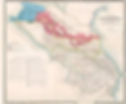Russian, Little Russian, Hardly Russian
- Peripheral Histories ISSN 2755-368X
- May 31, 2017
- 4 min read
Oleksandr Polianichev
Since the mid-1990s, the reconceptualization and re-examination of the Russian imperial experience, often referred to as the “imperial turn” in the Russian historiography, has led to the emergence of the burgeoning body of scholarship focused on imperial borderlands. Taken from the margins of historiography to the center of historical debates, the study of imperial rule at the edges of the Romanov monarchy has substantially de-peripheralized many imperial peripheral territories in terms of their relevance for the Russian imperial enterprise.
The history of the Russian imperial expansion in the North Caucasus, the field of research that for a long time remained predominantly a domain of military historians, has also been studied through the new lenses. Many scholars lay stress on the commonalities between the Russian imperial behavior in the North Caucasus and colonial practices of the Western European empires in their overseas possessions. Orientalism and numerous techniques of the typical colonial toolkit were characteristic of the Russian rule over these territories during much of the nineteenth century. However, what these studies often tend to neglect while referring to the “Russian” imperial presence or "Russian" colonizers is that the notion of “Russian” here itself requires a nuanced reconsideration and cannot be taken at face value even if the discourse of the day might suggest otherwise.

The westernmost part of the North Caucasus provides a particularly challenging problem. From the late eighteenth to the mid-nineteenth century, this region was colonized almost exclusively by people of Cossack estate and of Ukrainian/Little Russian origin. Although those Cossack Ukrainian speakers persistently figured in the official parlance as “Russians,” a closer look at sources reveals a fascinating entanglement of allegiances and loyalties of this community, which institutionally existed as the Black Sea Cossack host (after 1860 renamed the Kuban Cossack host). As the Cossacks’ settler colony was interwoven into a web of various cross-cultural engagements with indigenous Adyghe people, Great Russian-speaking Caucasus Line Cossacks, and career Russian militaries, the Black Sea Cossacks’ identifications and the sense of belonging were constantly re-negotiated. Furthermore, after the late 1860s, hundreds of thousands of peasants from central regions of the empire were allowed to move to and settle in this region, eventually outnumbering the Cossacks themselves. This created yet another long-lasting encounter, in which both the Cossacks and the newcomers formulated their understandings of self vis-à-vis each other. Contrary to what the authorities expected, many Cossack communities did not feel much affinity with those who they saw as aliens, making the idea of welding of the Cossacks and peasants infeasible in the short run.
In the early 1860s, the military administration of the Caucasus launched a plan of the mass expulsion of the Adyghe highlanders from their territories and the simultaneous colonization of the vacant lands by the “Russian element.” The “element,” largely comprised of the Cossack Ukrainian speakers, proved to be reluctant colonizers who strongly objected to leave their households. This dramatically affected the perception of them on the part of enraged authorities. In the eyes of the latter, Little Russian Cossacks appeared as an extraneous, malignant, and contagious part of the healthy “Russian body,” which could only be cured by vigorous Russification. Effectively, the Black Sea Cossacks emerged from this colonial situation as non- or, rather, not-yet-Russians.

Starting from the 1880s, however, the partial reversal of the governmental policies and priorities and the new accent on the restoration of the primordial, unadulterated Cossack way of life led to the reinvention of the Black Sea Cossack particularism. Their Little Russian specificity came to be seen as a vital source of the conservative traditions and the inherently Cossack virtues, as opposed to the corrupting influence of non-Cossack settlers. For the local elites, laying stress on the particularity of their community’s past also meant securing estate and regional privileges and, most importantly, rights to land. Their particularism was not framed in national terms and was essentially indifferent to the purposes of either Ukrainian or Russian nation-building. Clearly, Cossack elites tended to associate themselves with Russianness, broadly understood, but only as long as it was beneficial and as long as the imperial framework existed.
The imperial past of the North Caucasus shows us that cultural, social, political, and military developments at the margins of the empire were instrumental for shaping the content of Russianness and defining its boundaries. In this and many other ways, the periphery and the center mutually constructed each other. The case of the North Caucasus also challenges the efficacy of some established tools of historical analysis. The notions of “colonized” and “colonizers” intermingled and coalesced, familiar hierarchies took bizarre twists, ideas of “ethnos” or “nation” did not take root. Here and elsewhere, however, studying the periphery does not have to entail seeing it as a mere space of exceptions, curiosities, and provincial exoticism. Rather, it may invite us to reflect upon what we are used to thinking of as “normal” in the Russian history.
Dr. Oleksandr Polianichev is a former PhD candidate at the European University Institute in Florence and a research fellow at the New Europe College in Bucharest. His dissertation, entitled “Rediscovering Zaporozhians: Memory, Loyalties, and Politics in Late Imperial Kuban, 1880-1914,” examines how the idea of the Kuban Cossacks as the vestige and the heir of the Zaporozhian host affected the relationship between this region and the imperial center.


